
Lithuanian Jewish Community Statement on Genocide Center’s Newest Report on Kazys Škirpa

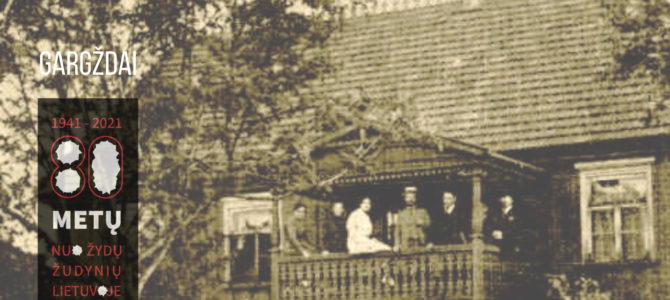
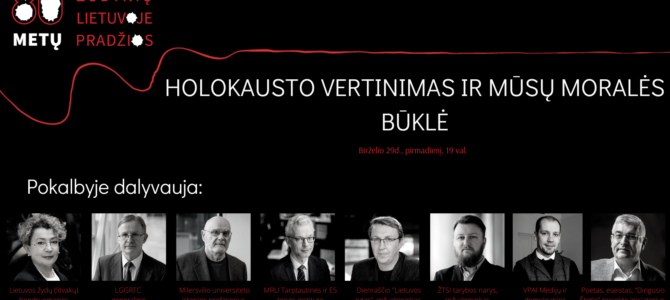
One of the most painful periods in Lithuania’s history began 80 years ago in the summer of 1941, the beginning of the Holocaust in this country. We lost hundreds of thousands of our fellow citizens constituting a significant portion of the population of Lithuania’s cities and towns. The Lithuanian Jewish Community is holding a virtual discussion in Lithuanian on June 28 to mark this painful anniversary.
Participants:
• LJC chairwoman Faina Kukliansky, attorney;
• Arūnas Bubnys, director of Lithuania’s Genocide Center;
• Saulius Sužiedėlis, professor emeritus, Millersville University;
• Justinas Žilinskas, writer, publicist and professor of the European Union Law Institute at Mykolas Romeris University;
• Vytautas Bruveris, writer and analyst, Lietuvos rytas newspaper;
• Paulius Gritėnas, philosopher, observer and member of the executive board of the Human Rights Monitoring Institute;
• Donatas Puslys, director of the media and democracy program, Vilnius Policy Analysis Institute.
Writer and director of the Šeduva Jewish Memorial Foundation Sergejus Kanovičius will moderate.
The discussion is scheduled for 7:00 P.M. on Monday, June 28. You can watch it live on the LJC facebook page:
https://www.facebook.com/events/777981389558688/
Vladimir Iskovič passed away June 22. He was born in 1950. Our deepest condolences to his children and relatives.
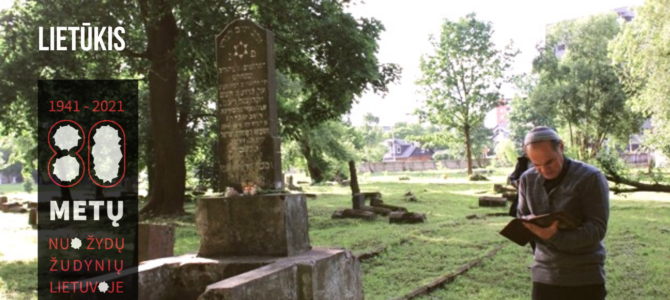
Around 50 Jewish men were tortured and murdered at the Lietūkis autoservice lot in Kaunas on June 27, 1941. Randomly grabbed off the streets, they were beaten with crowbars and water hoses were used to burst their stomachs. The victims included day workers, students, merchants, a musician, former director of the Industry and Trade Department of the Lithuanian Finance Ministry Jurgis Štromas and others. Many of the victims and perpetrators remain nameless to this day.
We will commemorate the victims of the Lietūkis Garage massacre and the 80th anniversary of the beginning of the Holocaust in Lithuania at 5:00 P.M. on June 28, 2021, at the monument to the victims located at Miško street no. 3 in Kaunas.
At 6:30 P.M. the same day we will unveil a new sign in remembrance of the victims at the Žaliakalnis Jewish cemetery, where it is believed they were buried.
The Kaunas Jewish Community and the city of Kaunas invite you to join us in remembering the innocent Jewish citizens of Lithuania who were murdered.
We would be grateful if you could announce your intention to attend by sending an email to ieva0102@yahoo.com
Gercas Žakas, chairman
Kaunas Jewish Community
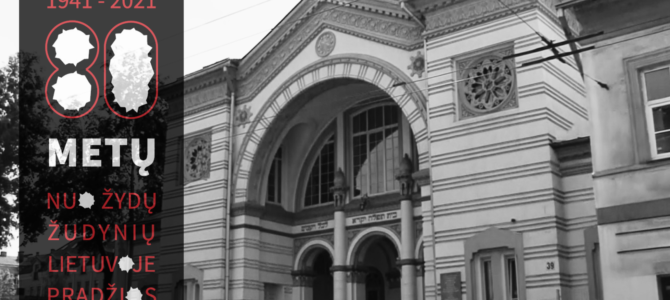
June 22, 1941, was the date the Nazis invaded Lithuania, Belarus and neighboring countries and the Holocaust began. Today the Choral Synagogue in Vilnius will hold a prayer service to remember the beginning of the Holocaust in Lithuania. Unlike in the West, Jewish victims in the East were mainly executed near their homes. Over just a few months in the summer and fall of 1941 the vast majority of the once-populous Jewish community of Lithuania were exterminated.
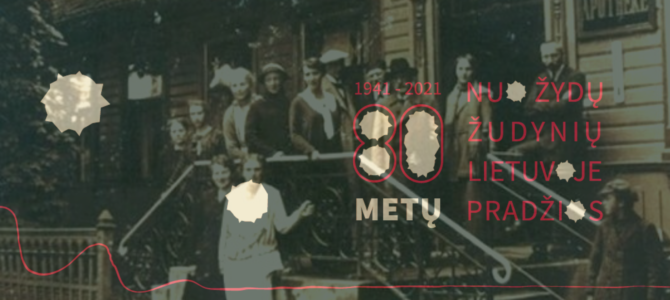
Palanga
The Lithuanian Jewish Community, the Palanga municipality and the Klaipėda and Palanga Jewish Communities commemorated the beginning of the Holocaust in Lithuania with a ceremony at the stone commemorating victims in the Palanga Botanical Garden on June 22.
Gargždai
A procession called “Path of Memory 1941-2021” to mark the 80th anniversary of the onset of the Holocaust in Lithuania is to be held starting at noon on June 23. Participants are invited to assemble at the former synagogue located at Kvietinių street no. 3, next to the Minija movie theater, whence the procession will move to the Jewish mass murder site on Klaipėdos street next to the bus station, culminating in a commemorative ceremony there.
Dveira Gražinskaja passed away on June 21. She was born in 1933. She was a member of the Union of Ghetto and Concentration Camp Prisoners. Our deepest condolences to her daughter Galina and her friends and relatives.
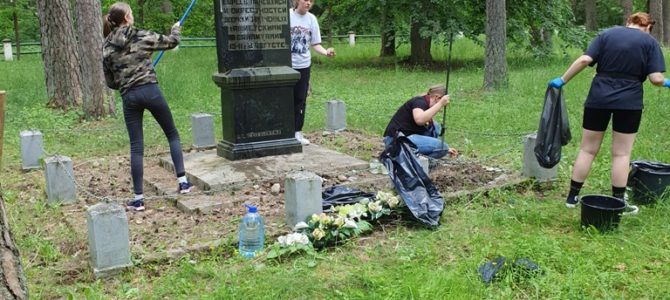
The Holocaust began in Panevėžys and Lithuania on June 22, 1941. We must not forget how Litvaks lived before the tragedy and how their history ended in 1941.
There are still eye-witnesses to the mass murder of the Jews who lived in the Panevėžys district before World War II. The first mass shootings began in July in the Panevėžys district when ghettos were set up in every town and city, in Panevėžys, Biržai, Kupiškis, Pasvalys, Rokiškis and elsewhere.
The Panevėžys Jewish Community and the scouts of Panevėžys have undertaken a project conceived by Michailas Adomas and Elena Adelina to maintain the mass murder sites in the district.
This time the clean-up began June 9 in the Kurganova Forest in the Panevėžys region. Volunteers including Panevėžys scouts and the chairman of the Panevėžys Jewish Community participated. The scouts learned about the Holocaust in Panevėžys, the Panevėžys district and Lithuania.
In total around 200,000 Jews were murdered in Lithuania with about 13,500 Jews murdered almost immediately in the Panevėžys region.
Chanė Varkulevičienė passed away June 18. She was born in 1934. Our deepest condolences to her son Rimantas.
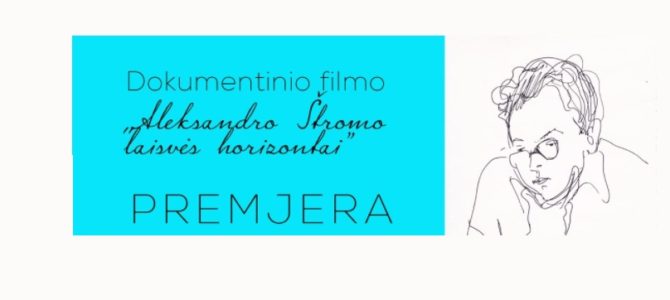
The Vilnius Jewish Public Library will premiere a film about Aleksandras Štromas called Laisvės Horizontai at 5:30 P.M. on Monday, June 21. The filmmakers Ona Bivenienė, Ilja Bereznickas and Saulius Sondeckis will be present. Seating is limited and prior registration is required. Send an email to info@vilnius-jewish-public-library.com or call (8-5) 219 77 48 before 5:00 P.M. to register. The library is located at Gedinimo prospect no. 24 in Vilnius, through the alley to the parking lot and find the first door on the right.

The Lithuanian Jewish Community wishes Aleksandras Asovskis a very happy birthday this milestone year. Mazl tov. Bis 120!

The Sabbath begins at 9:40 P.M. on Friday, June 18, and concludes at 11:32 on Saturday, June 19.
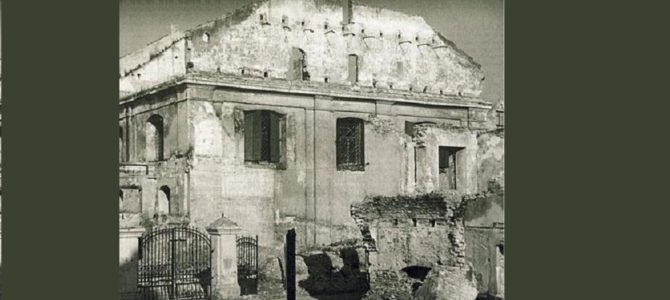
This article will first attempt to discuss what attitude towards Jewish property was held by the officials of the two main Lithuanian government institutions–the Lithuanian Provisional Government and the Vilnius City and District Citizens Committee–which existed in the first months of the German-Soviet war and by Catholic Church representatives. Second, using the example of one district, we will examine the fate of Jewish property in the Lithuanian countryside. Whether or not this model can be applied to other Lithuanian regions will be shown by further research.
Full article in Lithuanian here.
See also here.
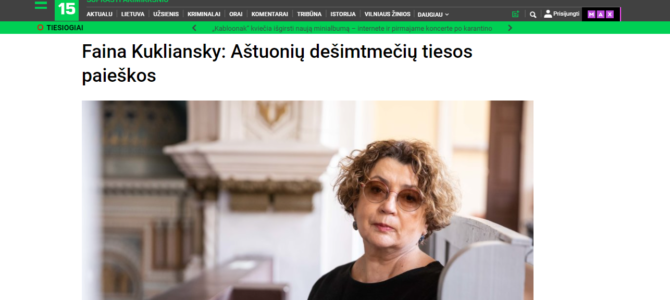
On June 15 the Lithuanian parliament adopted a resolution entitled “On Commemorating the 80th Anniversary of Great Losses and Resistance to the Occupations by Totalitarian Regimes” which says that “after Nazi Germany occupied Lithuania, the Nazis began to carry out the genocide of the Jews of Lithuania, opening the way for mass murders and violence, leading to the loss of the larger part of the Jewish Community.”
Full editorial in Lithuanian here.


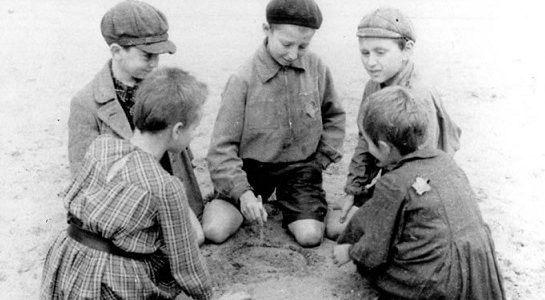
Photo: Children in Kaunas ghetto, courtesy Yad Vashem.
Today [June 15] the Lithuanian parliament adopted a resolution on commemorating the 80th anniversary of great losses and resistance to the occupations of Lithuanian by totalitarian regimes which says “After Nazi Germany occupied Lithuania, the Nazis began to carry out the genocide of the Jews of Lithuania, opening the way to mass murders and violence, leading to the loss of the larger part of the Jewish community.”
The language of the resolution is missing an essential element, a reminder that the mass murders were carried out with the aid of local collaborators. Would you like to put it more simply and clearly? There were people in the Lithuanian cities and towns who murdered their Jewish neighbors. Should we put it yet another way? There weren’t Nazi tanks and units standing by the side of the gravel pits on the forest margin, there were armed local men who fatally shot Jews lined up there, men, women and children [in Lithuania Jewish children were often murdered by smashing their heads against trees and rocks or with rifle butts in order to save ammunition–translator]. Another formulation which frightens us so much is also missing: there were Lithuanians among those who organized and physically carried out the genocide.
Does that sound horrible? But it’s the truth. The truth which is so hard to admit yet again. Perhaps the Lithuanian parliament is following the Lithuanian saying, “one teaspoon of tar ruins the barrel of honey?”
If so, it’s being misapplied, because the Lithuanian people aren’t a barrel of honey, and the Lithuanians who murdered Jews aren’t a teaspoon of tar. They are criminals who have committed crimes against humanity. A nation who can admit such people existed in its ranks is a brave and honorable nation. It’s not that their sins pass down to us, just that today’s generation is still afraid of the truth.
The Lithuanian Jewish Community had hoped the voice of the only Jewish member of the Lithuanian parliament, Emanuelis Zingeris, would be heard. He proposed amending the text of the resolution to read “the Nazis and their local collaborators.” He was not heard. Neither were the Lithuanian Jewish Community and the thousands of victims who stood before their armed neighbors, and millions of Jews and other people of goodwill around the world who are only asking for one thing, to face the truth.
Before writing this commentary, many people said: “It’s not worth raising the issue, it’s better to keep quiet, remain silent, not irritate, not sow discord.” But as Tomas Venclova said, “We should avoid descending into these scandals, but they will be inevitable as long as there are defenders of the Nazi collaborators.”
Faina Kukliansky, chairwoman
Lithuanian Jewish Community
Vladimir Savenkov passed away June 15. He was born in 1937. Our deepest condolences to his widow Olga.

Naftali Bennett was proclaimed prime minister of Israel at the Knesset session last Sunday by a one vote majority. He now becomes Israel’s 13th prime minister.
Naftali Bennett is a former software entrepreneur and an Israeli politician. He is the current leader of the Yamina Party.
Bennett was born in Haifa on March 25, 1972, to an American Jewish couple who had immigrated to Israel from San Francisco just after the Six Day War in 1967. He is the youngest of three sons.

The Lithuanian Jewish Community is pleased to announce the our annual Amehaye summer camp for 2021:
June 28-July 2 Children aged 7-10 (day camp), register here;
July 5-July 9 Ages 10 to 13 (including overnight), register here;
August 2-August 6 Ages 14 to 17 (overnight), register here;
July 18-July 23 Jewish scouts (overnight).
.
For more information send an email to amehaye2021@lzb.lt or call +370 601 46656.
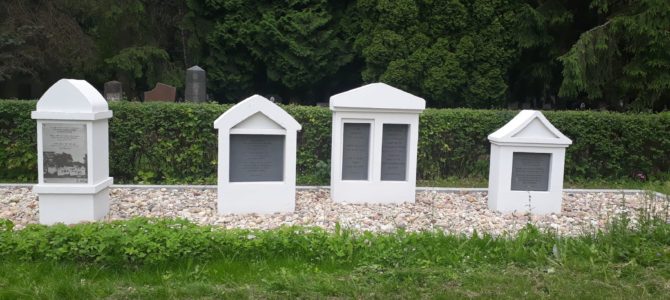
by Victoria Sideraitė-Alon
The old Jewish cemetery in the Šnipiškės (Shnipishok) neighborhood in Vilnius wasn’t destroyed in a single day. Back at the turn of the 19th to 20th century, the remains of 700 Vilnius Jews buried there were exhumed and reburied in a different part of the same cemetery during construction in the surrounding area.
Later during the Soviet era during the mid-20th century when work went on to extend what is now Šeimyniškių street, encroaching again on the old Jewish cemetery, these 700 burials were again exhumed and sent to a different grave. They were rediscovered in 2003 during construction of apartment houses next to Vilnius’s King Mindaugas Bridge. At the time, Lithuanian Jewish Community chairman Simonas Alperavičius resolved to have these 700 reinterred at the still-operational Jewish cemetery on Sudervės road in Vilnius. The reburial ceremony was attended by LJC officials and rabbis. The new grave there was marked with four posts.